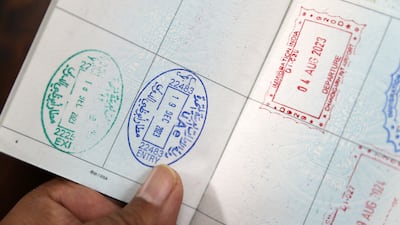Question: I have been offered a job in Dubai, but I have some concerns about what the company is telling me. I am in the UK and want to be sure before I spend the money on a flight and accommodation in Dubai.
It is a sales role, and I was expecting a probation period as you would have anywhere, but they have told me that they will not apply for a residency visa for me until I am taken on permanently and have reached a specific target.
The management have told me that is not a legal issue, as they call it training. They said they will let me have days off as I will need to renew my visit visa.
I have read you have to have a residency visa, so can you tell me if what I am being told is right? PS, UK
Answer: The law in the UAE is very clear that in order to undertake any work, a foreign citizen needs to have a residency visa.
The visa can be provided by the employer, a spouse or another legal sponsor, and the employer must also provide a work permit. There are no exceptions to this, although it is understood that the requirement is to have made the formal application at the time employment starts, with a short grace period for the process to complete.
It is not permissible to apply after a probationary period, as that means the person would be working illegally during that period.
The UAE Federal Government takes this issue seriously, and in 2007 issued Federal Decree Law No 7 for 2007, which amended the Immigration Law and increased the amount employers can be fined for failure to obtain proper visas and permits for employees from Dh10,000 ($2722) to Dh50,000.
In addition to this fine, employers can receive a fine of Dh50,000 from the Ministry of Human Resources and Emiratisation.
If an employer repeats the offence, the fines can increase.
A foreign company owner can have criminal proceedings brought against them but can also be deported and given a lifetime ban. If the owner is a UAE citizen, they can receive a jail sentence.
It is not only the employer who can be penalised; there are serious consequences for any employee who works without a visa and work permit. They can receive a labour ban, a substantial fine and be imprisoned for up to a month, although the authorities can extend this if they wish.
An employee who works without a visa and contract is not protected by law.
Any employer who tells new staff that they can work without a visa is breaking the law and being irresponsible, as both they and the employee risk fines and more.
This is a clear red flag if any company breaks the law from the outset, so I advise looking for a different job.
Q: I worked in Saudi Arabia for a few years and left in 2018. I left a small amount outstanding on a personal loan as I left when my role was terminated.
I have now been offered a new job in Dubai, but it will include travel to Al Jubail in Saudi. My concern is that the loan could cause a problem. Or will it be OK as it was more than five years ago? TP, Australia
A: If you left Saudi Arabia without having paid all debts, you are likely to have an issue, even if you had an exit visa. The bank could have filed a case against you.
Generally, you are considered to be a defaulter in Saudi Arabia once you fail to pay the minimum or agreed monthly instalments for more than 180 days from the due date.
If there is a case in the system, it will show up on the Saudi immigration system and you will be detained upon entering the country and not permitted to leave until the debt has been settled. This is not a risk anyone wants to take, not least as it can lead to imprisonment.
The sensible course of action is simply to contact the bank where the debt is and make arrangements to clear the outstanding amount. This is the right thing to do for any debt.
Given the time passed, it is likely that the amount of the debt has increased due to interest, and possibly also fees, added. Another reason for people not to leave debts unpaid for many years.
Once the debt has been settled in full, it is important to get confirmation in writing to avoid any potential future issues.
An outstanding debt in Saudi Arabia is not an issue in the UAE, as the systems are separate, but even with the ease of travel for residents, it can cause a major issue if wanting to travel within the GCC.
Keren Bobker is an independent financial adviser and senior partner with Holborn Assets in Dubai, with more than 30 years’ experience. Contact her at keren@holbornassets.comor at www.financialuae.com
The advice provided in our columns does not constitute legal advice and is provided for information only


